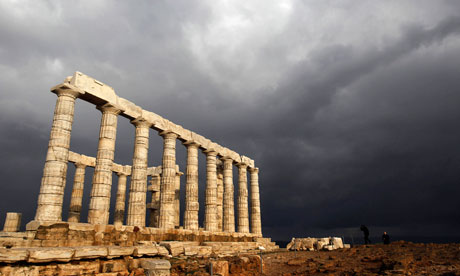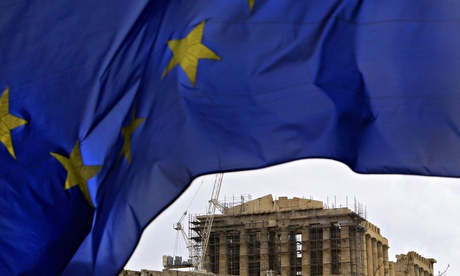The crisis in Europe is existential. It is a question of whether the EU survives as a recognisable entity. The history of the union is a chequered one, but it has chalked up great successes in its history so far. It has brought together a divided continent following the second world war and the fall of the Soviet empire. The single market has generated high levels of internal and external trade. The EU has fostered humanitarian projects around the globe. Critics say its component nations have sacrificed large parts of their sovereignty. The counter-argument, however, is that in a globalising world, by pooling areas of their sovereignty each nation gains more control over its affairs than it would otherwise have.
What hope is there, in what look like very dark days, that the EU can survive and even prosper? One should recognise to begin with that the causes of the crisis are many. Some go well beyond Europe – most importantly the troubled nature of the world economy – while others touch on failings. The EU is slow-moving and not equipped to deal with situations demanding urgent and immediate action. Most discussion has concentrated on the fact that the euro was established without fiscal back-up or a lender of last resort. Just as important is that the economic convergence that was supposed to occur between more well-off and poorer countries did not happen. The Lisbon Agenda, designed to make the EU economy "the most competitive in the world", was ignored by the countries that needed it most – especially the southern countries. Instead, for example, of pushing through pension, healthcare or labour market reforms, governments simply borrowed to fulfill their commitments. A dislocation between north and south opened up, with Germany's economy becoming the most prosperous.
The list of problems the EU faces is truly formidable. It isn't surprising that confusion seems to reign and that many citizens are turning away from the union. Nationalism is on the rise again all over Europe. What cause is there for hope? Perversely, it lies in some large part in the shock experience of the crisis itself. Much more radical and immediate innovations open up in such a situation than in more placid times.
An effective short-term response to the travails of the euro is obligatory. Let's suppose – perhaps with a dose of external help – that the euro will survive, as still seems most likely. The best outcome at this point, contrary to what many others argue, would be for the eurozone to be preserved with its full membership of 17 nations including, if at all possible, Greece. It may in fact be the only way in which needed reforms within the struggling countries can be achieved.
A recent detailed study by Euro Plus Monitor indicates that the convergence that didn't happen when the euro was first introduced is now occurring very rapidly. The research ranks eurozone countries in terms of their overall economic health and the speed with which they are adjusting their economies. The nations that came rather nastily to be referred to as the Pigs – Portugal, Ireland, Greece and Spain – are all within the top six in respect of the sweeping nature of their reforms. They are opening up labour markets, elevating the age of retirement, streamlining ponderous government agencies and reducing tax evasion. As the earlier experience of the more successful countries has shown, such changes are the condition of preserving an effective welfare state – the "European social model".
Greece is bottom of the 17 nations in terms of its overall economic status, but ranks number two in terms of the degree of adjustment happening in its economy. The authors rightly argue that there is a pressing need to move the European debate away from concentrating only upon short-term austerity towards long-term reforms to promote wealth-creation. Taking Greece as an example, they argue that external help as well as internal restructuring should focus on creating investment opportunities and opening up new markets. They conclude by observing that, although there will undeniably be a period of suffering, the eurozone countries might just emerge stronger than the US and Japan, which are not making such reforms.
Several member states have stated their intention to join the euro if its current problems are overcome. The UK will be part of a tiny group that stands aside. Radek Sikorski, Poland's foreign minister, has observed that Britain's total sovereign, corporate and household debt is several hundred per cent of GDP. "Are you sure markets will always favour you?" he asks. If the euro does survive and expand, it will be a question the British leadership would do well to ponder.
What about the fate of democracy in all this? Those who have assumed the mantle of the saviours of the EU – Angela Merkel and Nicolas Sarkozy, together with the "technocrats" in Greece and Italy – are largely bypassing the decision-making agencies of the union. The celebrated philosopher Jürgen Habermas has bitterly complained that democratic processes have been subverted, as indeed they have.
Yet the greatest threat to democracy at this point would be the collapse of the euro and the chaos that would ensue. Stabilising the euro should be a bridge to longer-term change and a stimulus to the imagination. A new debate should be encouraged across Europe about how traditional limitations of the EU – its lack both of dynamic leadership and of democratic legitimacy – might be overcome. It has long been a contradiction that an organisation busy promoting democracy across the world should itself famously suffer from a democratic deficit.
Anthony Giddens is a member of the House of Lords











